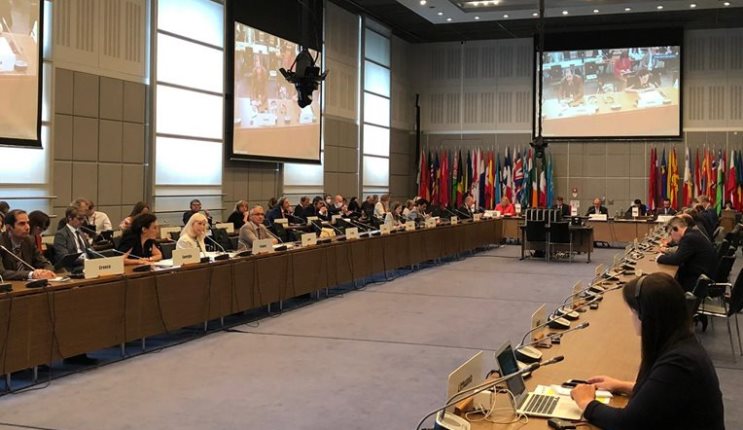On 3 September 2020 the OSCE Permanent Council met to discuss, at the initiative of the Georgian delegation, Russia’s large-scale military aggression against Georgia and occupation of Georgia’s Abkhazia and Tskhinvali regions.
Georgia’s Permanent Representative to OSCE, Ketevan Tsikhelashvili highlighted that 12 years after the August war, Russia continues to defy the EU-mediated Ceasefire Agreement of 12 August 2008. Moreover, expanding military build-up of the occupied regions, Russia is taking steps towards their actual annexation.
Even amid the COVID-19 pandemic, Russia does not seem to give up on its provocative actions. Quite the contrary: it actively uses tools of hybrid warfare against Georgia. Reference, in this light, was made to Russian officials’ increasing number of unfounded allegations against the Richard Lugar Laboratory.
According to the Georgian delegation, fortification of the occupation line through installation of barbed wire fences and other artificial barriers, as well as illegal detentions of local residents still continue to be reported. The Georgian ambassador, in this context, focused her attention on the wounding and illegal detention of Georgian citizen Zaza Gakheladze. She stressed the necessity to immediately release Zaza Gakheladze and two more people recently detained by the occupation regime – Gennady Bestaev and Khvicha Mghebrishvili.
The Georgian delegation spoke about the humanitarian problems caused by the occupation. According to the ambassador, local residents, especially in the Akhalgori district, found themselves in a very difficult situation and 15 people died as they had been denied access to critical health services as a result of the closure of the so-called checkpoints and restrictions on movement.
The Georgian Ambassador expressed her concern over Russia’s restricting an access to international human rights monitoring mechanisms, including to EUMM, to the occupied territories, as well as over Russia’s refusal to create international security mechanisms on the ground.
According to Ambassador Tsikhelashvili, notwithstanding serious humanitarian and security challenges, the Georgian Government remains committed to the peaceful conflict resolution agenda and democratic development processes. Our efforts are directed towards de-occupation of the country and reconciliation between the communities divided by occupation lines – she said. The Ambassador also spoke about the new peace initiative of the Government of Georgia “A Step to a Better Future”.
The Georgian delegation highlighted the importance of the Geneva International Discussions, and the need to achieve progress on such issues as the non-use of force commitment, creation of international security mechanisms on the ground and return of refugees and IDPs to the places of origin.
The EU, U.S. and Ukrainian delegation made statements in support for Georgia during the meeting. They reaffirmed their support for Georgia’s sovereignty, independence and territorial integrity within its internationally recognized borders.
The Group of Friends of Georgia also delivered a Joint statement on behalf of Bulgaria, Canada, Czech Republic, Estonia, Finland, Ireland, Latvia, Lithuania, Norway, Poland, Romania, Sweden, Ukraine, the United Kingdom and the United States of America.
In their joint statement, the delegations of the Group of Friends express their concen over the continued occupation of parts of the territory of Georgia and the intensified provocations by the Russian Federation. They condemn the so-called borderization process, which violates the rights of local residents, including freedom of movement.
The delegations call upon the Russian Federation to fulfill immediately its clear obligation under the EU-mediated 12 August 2008 ceasefire agreement to withdraw its forces to pre-conflict positions. They also reaffirm their unwavering support to the EU Monitoring Mission (EUMM) and call upon the Russian Federation to allow the EUMM to implement its mandate in full, including by enabling the EUMM’s access on both sides of the administrative boundary lines.
The delegations support the peace initiative of the Government of Georgia, ‘A Step to a Better Future’, aimed at improving the humanitarian and socio-economic conditions of people residing in Georgia’s Abkhazia and South Ossetia regions and at fostering confidence building among divided communities to the benefit of all affected people.
The Group of Friends delegations express their support for the peace initiative of the Government of Georgia, ‘A Step to a Better Future’, aimed at fostering confidence building among divided communities to the benefit of all affected people, and welcome the program’s initial successes, including the launch of its education programs and the “Enterprise for a Better Future” grants program, which already registered high interest and engagement of communities on all sides of the administrative boundary lines, as well as the establishment of the Peace Fund for a Better Future.
The OSCE Permanent Council has held discussions on the occasion of the 12th anniversary of the Russia-Georgia war

Monday September 7th, 2020



